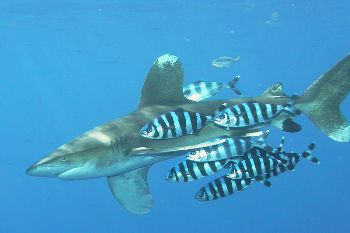Sharks that dwell in the Maldives can breathe a sigh of relief: the island nation has declared 90,000 square kilometers of the Indian Ocean a safe-haven for sharks, banning shark fishing as well as any trade in shark fins.
“The Maldives were one of the first countries to recognize that sharks were a key reason tourists went to dive there,” said Matt Rand, director of Global Shark Conservation for the Pew Environment Group. “Today’s announcement protects the Maldives’ tourism industry—the largest segment of their economy—from the ravages of the shark fin trade. It is a bold and farsighted move on the part of the government of the Maldives.”
 Oceanic whitetip shark. Photo by: Peter Koelbl. |
The protected waters are home to thirty species of shark, including the scalloped hammerhead and the oceanic whitetip, both of which are up for protection at the next meeting of the Convention on International Trade in Endangered Species (CITES). The IUCN Red List classifies the scalloped hammerhead as Endangered, and the oceanic whitetip as Vulnerable to extinction.
The Maldives, a popular tourist location, depends on its pristine beaches, coral reefs, and marine wildlife, such as sharks, for much of its tourism industry. Globally tourism focused on seeing sharks in the wild is a growing business.
“Countries are beginning to recognize just how important vibrant shark populations are to healthy ocean ecosystems, and to their ecotourism industries,” explains Rand.
The trade for shark fin soup has devastated shark populations worldwide: sharks are caught, finned (whereby fishermen cuts off their fins), and then tossed overboard into the ocean to perish. It is estimated that 73 million sharks are killed every year for their fins alone.
Currently, 32 percent of open ocean shark species are threatened with extinction.
Related articles
UN to protect seven migratory sharks, but Australia opts out
(02/17/2010) One hundred and thirteen countries have signed on to an agreement to protect seven migratory sharks currently threatened with extinction byway of the Convention on the Conservation of Migratory Species of Wild Animals (CMS), according to the UN Environment Program (UNEP). The agreement prohibits hunting, fishing, or deliberate killing of the great white shark, basking shark, whale shark, porbeagle shark, spiny dogfish, as well as the shortfin and longfin mako sharks. However, Australia has declared it will ignore certain protections.
Actions taken to save sharks ‘disappointing’
(11/15/2009) Environmentalists say that the International Commissions for the Conservation of Atlantic Tuna (ICCAT) did not do enough in their yearly meeting to protect the ocean’s sharks.
Over 30 percent of open ocean sharks and rays face extinction

(06/25/2009) The first global study of open ocean (pelagic) sharks and rays found that 32 percent of the species are threatened with extinction largely due to overfishing and bycatch, making pelagic sharks and rays more threatened than birds (12 percent), mammals (20 percent), and even amphibians (31 percent), which are considered to be undergoing an extinction crisis. The situation worsens when only sharks taken in high-seas fisheries are considered: 52 percent of these species are threatened.














